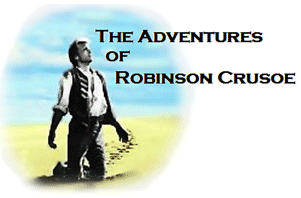|
Click on the banners to see the relevant pages |
|
 |
|
|
|
| Franco
London Films made 3 different 'cuts' of the show - a 4-part version,
a 6-part version and a 13-part version to accommodate the different
broadcasting requirements of countries buying the series. Certain
scenes were shot with different actors for the German cut and some
extra scenes were filmed, e.g. Wooseley's niece, the Blind man and
Jenny do not appear in the French or English versions. Starring Austrian
actor Robert Hoffman as Daniel Defoe's 'Robinson Crusoe, with Fabian
Canalos also appearing in the last four episodes as 'Friday', the
island scenes of the 13 x 25 minute episodes were shot mainly in the
Canary Islands. It continued to be transmitted sporadically at various times for many years after which the tapes were 'lost' - apparently dumped into a skip by mistake during a clear-out of old material. Fortunately, the 'English' version was still to be found deep in the archives of a French television library 15 years later and have now been restored and released, first on video and latterly available on DVD. Possibly the most memorable thing about the series is the haunting theme tune and soundtrack by Robert Mellin and Gian-Pero Reverberi, quite amazing for a fairly low-budget production. Strangely, the French version has a different musical score, by George Van Parys, which contains a lot of harpsichord and is arguably less evocative. Neither does the French version have the wonderful conversational narration of Lee Payant (actually born in Seattle, U.S.A. in 1924), Robinson Crusoe's charming 'English' tenor voice for the greater part of the series, apart from sequences involving direct dialogue from Hoffman himself, usually in flashback sequences or in conversation with Friday. Payant ran a popular Paris 'left bank' cafe, L'Abbaye, with his lover Gordon Heath until his death in 1976. |
Cast
Robert Hoffman ...............Robinson Crusoe Lee Payant .....................Voice of Robinson Crusoe (English dub) Fabian Cevallos ..............Friday Jacques Berthier .............Robinson's father Phillipe Ogouz ................Rodney Jacques Gougin Francis Chares Phillipe Bruneau .............Robinson's friends in York Guy Mairesse .................Captain of the Guard Alain Nobis .................... Jeremias B.Wooseley, the lawyer (part 2) Robert Dalban ................ Captain Darrick (parts 4/5) Jacques Dynam .............. Bush, second mate on Darrick's ship (part 5) Luc Andrieux .................. Kasir, the fishmonger (part 6) Additional Cast of German Cut: Erich Bludau ......................Robinson's father Jane Marken ......................Jenny, the Crusoe's housekeeper Oskar von Schab ................Jeremias B. Wooseley, the lawyer Claudia Berg ......................Wooseley's niece Paul Chevalier ....................Blind man Michael Chevalier ...............Narrator |
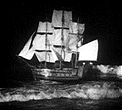
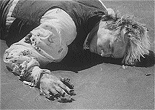
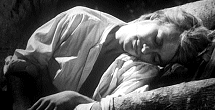
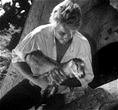
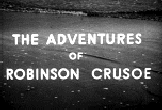
| The series is based on Daniel Defoe's classic novel written in 1721 which itself was based on the true survival story of Alexander Selcraig (a.k.a. Selkirk) from around the turn of the century. Robinson Crusoe's island locations were filmed at Playa del Ingles at the southern end of Gran Canaria. The Moroccan 'slave' scenes were filmed further along the coast at Playa de Maspalomas and Maspalomas. The village of Cruz de Tajeda, located inland, was used for the 'Brazilian' scenes. The 'English' locations (York and Hull) were shot in Normandy, France. Sadly, as Hoffmann explains in his interview, many of the then remote and secluded locations in the Canaries used for filming have since been urbanised and constructed on. However, you can actually visit the real original 'Robinson Crusoe' Island, Juan Fernandez Archipelago, book a tour of the island and even a holiday there. |

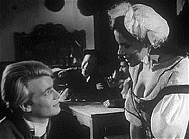
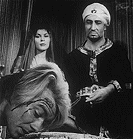
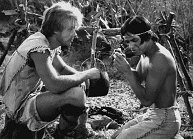
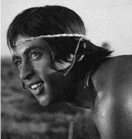

| Robert Hoffmann, born 30th August 1939 in Salzburg, Austria, is by far best known for his debut performance in the title role of this cult series, but has also appeared in many other film and television productions Germany, Italy, France and occasionally the UK, notably as the U-boat Captain in the 1980 film "The Sea Wolves" starring Gregory Peck, Roger Moore, David Niven, Trevor Howard and Patrick Macnee. He also appeared, briefly, in the epic US television series 'Dallas'. In 1997 he was interviewed for the V.I.P show when the Robinson Crusoe series was eventually released on video. This interview is contained in the 2007 Network DVD release of the series. |

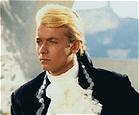 |
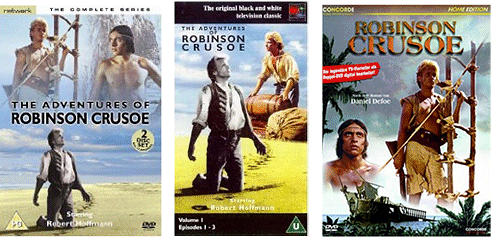 |
Video In 1997 the complete series was released on 4 volumes of VHS video by Network thanks to Tim Beddows who tracked down the only known English language prints to a French film vault. However, these were only 16mm prints - original 35mm prints used by the BBC between 1965 and 1982 had been lost and no other 35mm prints survived. In 2006 the 4-part German version was released on DVD by Concorde Home Entertainment using restored 35mm prints. In 2007 Network released the series on DVD as a two-disc set with extra features including a merchandise gallery, the first episode of the original French series with Portuguese subtitles and an alternate musical audio track (overdubbed for US and UK broadcast), and an image gallery which includes stills from the 'missing' German scenes. |
|
Audio In February
1966 a 7-inch single of the theme tune (Main Theme from Robinson
Crusoe / Adrift) by the Franco London Orchestra was released by
Philips records (BF 1470) in the UK and an LP record of George van
Parys' original score was released in France by Petit Menestrel
Records (ALB 405). Subsequent re-releases by Philips included 'Theme
from Robinson Crusoe / Adrift' (March1967 - Philips BF 1562) and
'Main Theme from Robinson Crusoe / Adrift' (August 1969 - Philips
BF 1806). An LP was also released in Germany by Polydor records.
In 1990 Silva Screen released the music from the English dub of
the series by Robert Mellin and Gian-Piero Reverberi on CD, the
tracks being taken from tapes kept by Robert Mellin in Italy. An
extended version was released in 1997, as more tapes were found
at Franco London Films in France. |
 |
Episode List (13-part)
1. (First shown 12th October 1965)
The year is 1697 and, while passenger on the 'Esmeralda' sailing from Brazil to Guyana, the ship is hit by a terrible storm and Robinson Crusoe finds himself to be the sole human survivor, shipwrecked on a desert island off the coast of South America.
2. (First shown 19th October 1965)
Crusoe builds a shelter in a tree and finds a solution for the lack of food and encounters his first companion, a dog that also survived the wreck. He spends much of his time reminiscing about his youthful activities in York.
3. (First shown 26th October 1965)
Robinson recalls leaving home and travelling to Hull to seek a ship. The remains of the 'Esmeralda' are washed near the shore and he busies himself salvaging as much as possible before it sinks.
4. (First shown 2nd November 1965)
Robinson finds a hoard of treasure aboard the wreck, although it is not much use to him. He recalls his first sea voyages and finds a cave which becomes his new home.
5. (First shown 9th November 1965)
Attempts at making furniture prove to be less than successful. Crusoe's memories take him back to his first real voyage and the events that resulted in him being captured and placed in slavery.
6. (First shown 16th November 1965)
A fire in his cave destroys all he has created. While rebuilding his home he recalls how he escaped from slavery and the events that led him to become owner of a Brazilian banana plantation.
7. (First shown 23rd November 1965)
Robinson's recollections relate how he came to be aboard the ill-fated 'Esmeralda'. He makes a disastrous attempt to enlarge his living quarters and starts to construct a canoe with which to escape the island.
8. (First shown 30th November 1965)
Robinson becomes adept at making items such as baskets, pottery and bread. He explores his island and discovers another ship that has run aground from which he salvages more useful items.
9. First shown 7th December 1965)
Robinson and his animal companions 'celebrate' his third year on the island with a banquet. Having had rather too much to drink, he returns to the wreck to try and find more rum. He falls asleep and wakes to find that the ship has floated away from his own island.
10. (First shown 14th December 1965)
Robinson finds himself on a new island and this time sees footprints in the sand, discovering that the island is visited by fierce cannibals! He rescues one of their planned victims and names him 'Friday' after the day of the week.
11. (First shown 21st December 1965)
Despite Robinson's attempts to educate Friday in how to be 'civilised', Friday does not seem to be enamoured by the idea of becoming a manservant and runs away.
12. (First shown 28th December 1965)
Friday returns to Crusoe, much to his relief, having blamed himself for the departure of his only companion. Some other, more unwelcome, company arrives on the island - mutineers!
13. (First shown 30th December 1965)
Friday and Robinson fight and manage to defeat the murderous mutineers and eventually make their escape from the island. Returning to England, they start writing the story of their adventures.
|
All
Original Material
|




